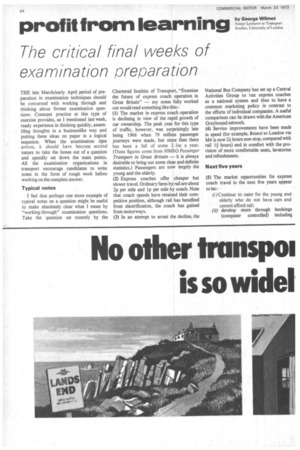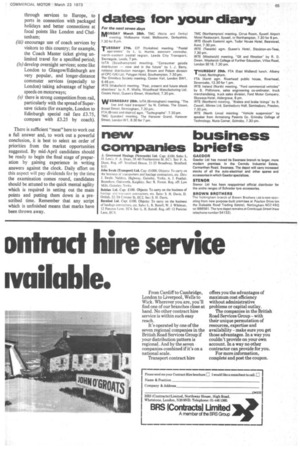profit from learning
Page 62

Page 63

If you've noticed an error in this article please click here to report it so we can fix it.
by George Wilmot
Senior Lecturer in Transport Studies, University of London.
The critical final weeks of examination oreoaration
THE late March/early April period of preparation in examination techniques should be concerned with working through and thinking about former examination questions. Constant practice at this type of exercise provides, as I mentioned last week, ready experience in thinking quickly, assembling thoughts in a businesslike way and putting these ideas on paper in a logical sequence. When the examination date arrives, it should have become second nature to take the bones out of a question and speedily set down the main points. All the examination organizations in transport encourage candidates to write notes in the form of rough work before working on the complete answer.
Typical notes
I feel that perhaps one more example of typical notes on a question might be useful to make absolutely clear what I mean by "working-through" examination questions. Take the question set recently by the Chartered Institite of Transport, "Examine the future of express coach operation in Great Britain" — my notes fully worked out would read something like this: (1) The market in express coach operation is declining in view of the rapid growth of car ownership. The peak year for this type of traffic, however, was surprisingly late being 1966 when 79 million passenger journeys were made, but since then there has been a fall of some 2-3m a year. (These figures come from HMSO Passenger Transport in Great Britain -it is always desirable to bring out some clear and definite statistics.) Passengers are now largely the young and the elderly.
(2) Express coaches offer cheaper but slower travel. Ordinary fares by rail are about 2p per mile and lp per mile by coach. Note that coach speeds have retained their competitive position, although rail has benefited from electrification, the coach has gained from motorways.
(3) In an attempt to arrest the decline, the National Bus Company has set up a Central Activities Group to run express coaches as a national system and thus to have a common marketing policy in contrast to the efforts of individual companies. A useful comparison can be drawn with the American Greyhound network.
(4) Service improvements have been made in speed (for example, Bristol to London via M4 is now 2+ hours non-stop, compared with rail 1+ hours) and in comfort with the provision of more comfortable seats, lavatories and refreshments.
Next five years (5) The market opportunities for express coach travel in the next five years appear to be: (0 Continue to cater for the young and elderly who do not have cars and cannot afford rail; 00 develop more through bookings (computer controlled) including through services to Europe, to ports in connection with packaged holidays and better connections at focal points like London and Cheltenham; (iii) encourage use of coach services by visitors to this country; for example, the Coach Master ticket giving unlimited travel for a specified period; (iv) develop overnight services; some like London to Glasgow/Edinburgh are very popular, and longer-distance commuter services (especially to London) taking advantage of higher speeds on motorways; (v) there is strong competition from rail, particularly with the spread of Supersave tickets (for example, London to Edinburgh special rail fare £3.75, compare with £3.25 by coach).
There is sufficient "meat" here to work out a full answer and, to work out a powerful conclusion, it is best to select an order of priorities from the market opportunities suggested. By mid-April candidates should be ready to begin the final stage of preparation by gaining experience in writing answers against the clock. Daily effort on this aspect will pay dividends for by the time the examination comes round, candidates should be attuned to the quick mental agility which is required in setting out the main points and putting them down in a prescribed time. Remember that any script which is unfinished means that marks have been thrown away.












































































































